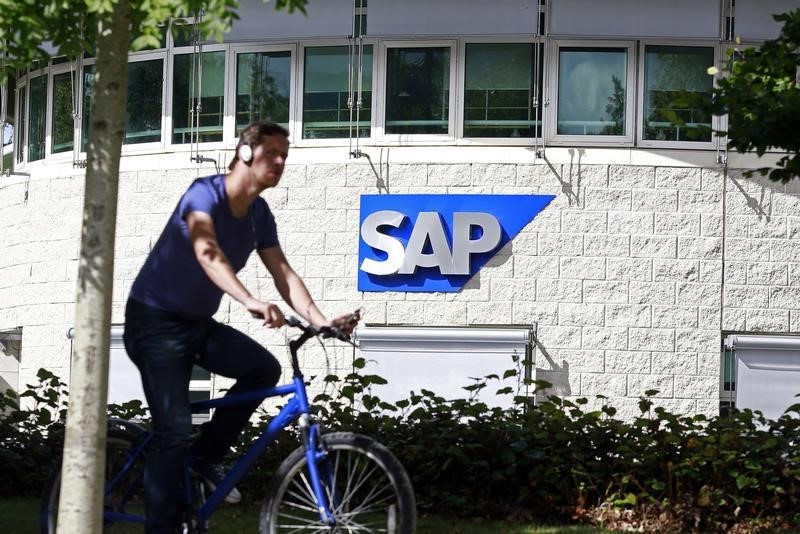By Harro Ten Wolde
WALLDORF, Germany (Reuters) - Europe's largest software group SAP SE (DE:SAPG) has cut key profit forecasts and abandoned a target for higher margins, saying its stepped-up push to deliver products via the cloud would dampen profitability until at least 2018.
The German company is in industry race to deliver business planning software via cloud-based internet services, rather than as packaged software running on customers' in-house computers. But it says this move will force it to backtrack on long-promised, oft-delayed margin gains that had been a big investor draw.
SAP is battling alongside established U.S. software makers such as Oracle (N:ORCL), IBM (N:IBM) and Microsoft (O:MSFT) to boost internet-based software sales and fend off pure cloud-based rivals Salesforce.com (N:CRM), Workday (N:WDAY) and, less directly, industry pacesetter Amazon.com's (O:AMZN) Web unit.
"We are in a market-share game," SAP Chief Executive Bill McDermott told reporters. "If you can combine a healthy cloud-growth business with high renewal rates, meaning a customer is very loyal ... you can really expand the margin."
Shares of SAP dropped 4.4 percent, the biggest losers in Germany's blue-chip DAX index (GDAXI). The stock has fallen more than 9 percent in the past year, underperforming the STOXX Europe 600 Technology Index (SX8P), up more than 10 percent.
SAP, one of Europe's last big tech companies competing on a global scale, said it expects 2017 operating profit of between 6.3 billion euros (4.82 billion pounds) and 7 billion, excluding special items, on revenue of 21 to 22 billion. Its prior forecast was for operating profit around 7.7 billion euros.
At the midpoint of those ranges, the operating margin for 2017 would be just under 31 percent, well below a 35 percent target set a year ago. Last January, SAP pushed back its target to deliver a 35 percent margin by 2015 for two years and has now effectively dropped that goal in favour of boosting cloud sales.
Analysts at investment bank Morgan Stanley told clients SAP's five-year outlook could be decoded as trying to be conservative after 18 to 24 months of struggling to meet or cutting targets. Or on a more pessimistic interpretation, that cloud growth meant lower margins for the foreseeable future.
CLOUDY PROFITS
"The bear (negative) view will be that lower margins (are) the new reality and SAP is confirming that view," wrote Morgan Stanley analyst Adam Wood, who rates the stock "overweight" but said he would be revising his earnings estimates downwards.
Research firm IDC predicts the cloud software market will have a compound annual growth rate of 21.3 percent over the next five years, five times faster than classic packaged software. Cloud delivery makes data easier to manage, analyse and use, not just on computers but also mobile phones and other devices.
But delivering software via the Internet requires higher initial costs and revenue is recognised over time, rather than upfront as for packaged software, squeezing short-term margins.
SAP said it expects cloud software subscriptions and support revenue to approach the level of revenue from its traditional licensed software business by 2018.
Looking further ahead, SAP said it is targeting operating profit, excluding special items, of between 8 and 9 billion euros in 2020 on revenue of 26 billion to 28 billion.
SAP had warned in September that it had to evaluate its mid-term targets after buying U.S. expenses software maker Concur for $7.3 billion, its largest merger deal ever, which it said would speed up its transition to cloud computing.
Last week, the company said 2014 cloud software revenue rose 45 percent to 1.1 billion euros, but this growth had cut margins, resulting in just a 1 percent rise in operating profit.
Chief Financial Officer Luka Mucic ruled out further large acquisitions over the next few years in order to concentrate on cutting its leverage and increasing dividends to shareholders.
